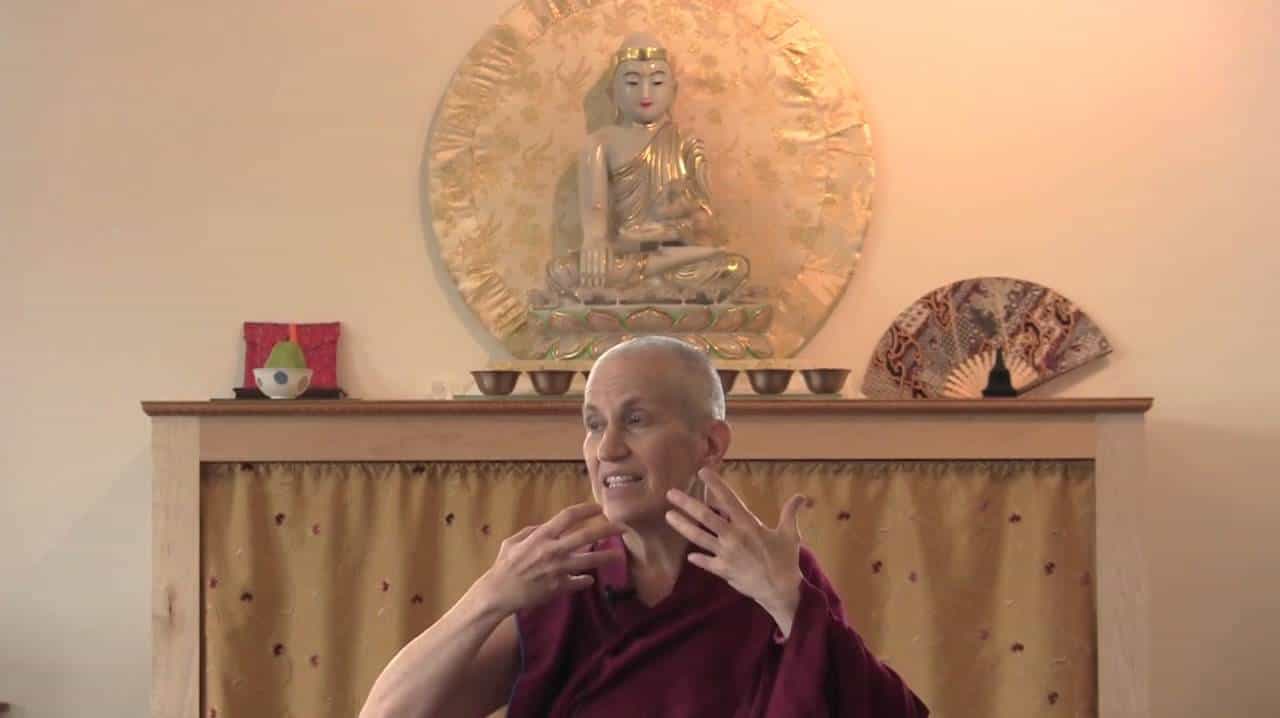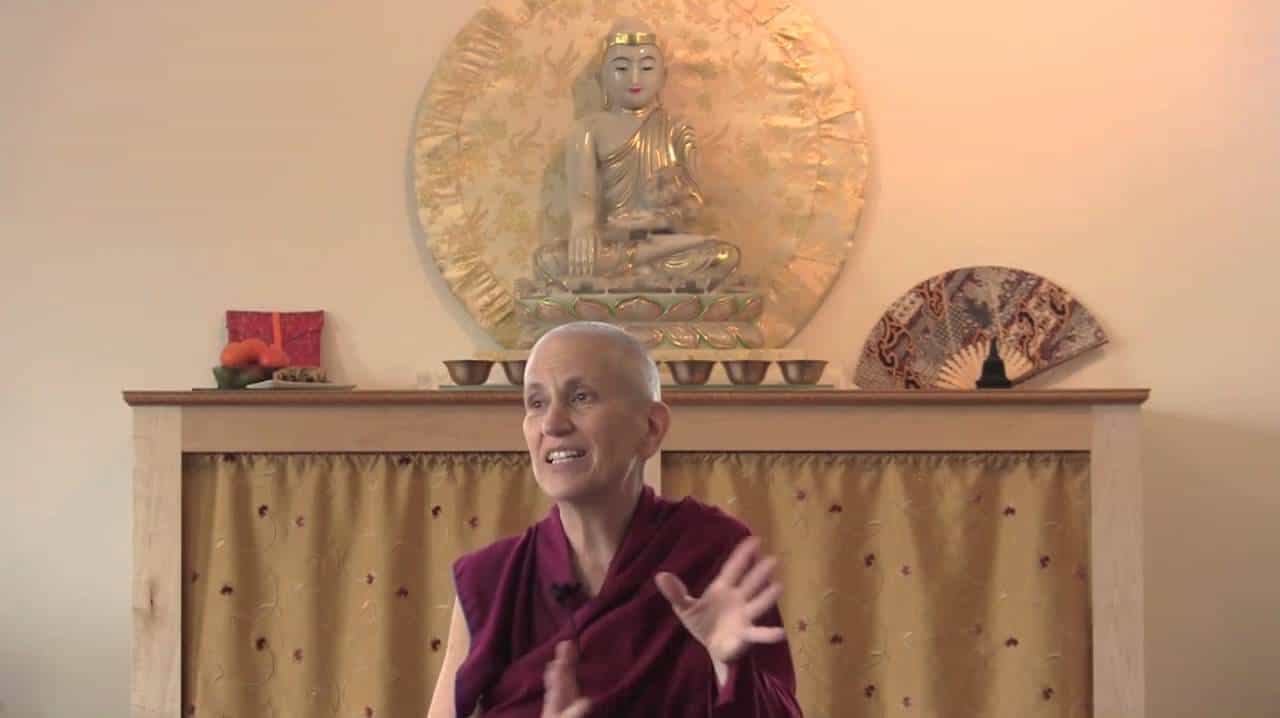Verse 3: The fire of anger
Part of a series of talks on Gems of Wisdom, a poem by the Seventh Dalai Lama.
- Our petty, judgmental mind arises due to attachment
- Suffering arises when our high expectations are not met
- Cultivating open-hearted care for others without attachment
Gems of Wisdom: Verse 3 (download)
So we’ll continue with Gems of Wisdom by the Seventh Dalai Lama. So Verse 3 says: “What is the great fire that rages when we approach too closely to others?”
Audience: Anger.
Venerable Thubten Chodron: The answer is: “Terrible anger that cannot bear even the smallest challenge.”
What is the great fire that rages when we approach too closely to others?
Terrible anger that cannot bear even the smallest challenge.
Caring for others versus being attached to them
So, “What is the great fire that rages when we approach too closely to others?” This does not mean that we should not be close to others. What it means is when we approach others with attachment. So when we approach and we’re attached to them, or we approach and we’re attached to our own ideas, or our own wishes. So it doesn’t mean that you stay an arm’s length away from everybody, okay. Because clearly bodhisattvas are involved with others and approach them and care about them. But when we approach other people and we get attached to them, or we’re full of all of our own ideas, our own preferences, the way we think things should be done, what we want…. When we approach others and we have all of that swimming in the background of our mind, then what’s going to happen when we’re with others? They’re not going to do what we want them to do.
How attachment leads to misery
And we have so many rules in our mind about what people should do. It’s not like there’s open space in our mind, whereby somebody could do this or they could do that, and you know, they could eat grapes, they could eat apples, they could sit under this tree, they could sit under that tree. No, in our mind everybody has to sit under this tree. Everybody has to eat grapes. Everybody has to do this or that. There’s no space in our mind for anybody to do anything else except what we want them to do without our getting angry.
So when we have a lot of opinions and preferences and “shoulds,” we are setting ourselves up for anger and misery. That doesn’t mean that you have no preferences and, “Oh I could drink water, I could drink rat poison, it’s all the same.” No, we’re not talking about that. You can have preferences, you can have ideas and opinions. It’s the attachment to them that causes the problem.
Practical preferences without attachment
You know, when I look at my teachers—on small things they don’t really care—but on certain things…. There are things where they have definite preferences. But if the preference doesn’t happen—if the situation doesn’t come about that way—they don’t get all angry and upset about it. But for us, we have so many preferences and opinions that we are attached to, that when somebody doesn’t agree with them we flip out. And so we have preferences and opinions about important things, but also so many of our daily life disputes with people are actually about things that are not so important. (e.g.): “Why did you put the paperclips in this container?” “Don’t you know that the salad goes there, it doesn’t go here.” “Why did you wash the towel with this load of laundry? You should have washed it with that.”
You know? Things that…. Really? This is important? But we get fixated on a lot of small things and then get upset. And even there’s things that we consider are big important things that are actually not such big important things. But we get really upset when other people don’t do what we want. “I want the logs cut like this, I don’t want them cut like that.” “I want the pansies planted here, and you know, what happened to the jumping jack pansies? We used to have them last year, they’re not in the garden this year, what’s the story? Didn’t you notice?”
Examining our expectations
So there’s a lot of stuff that’s just plain small, and then there’s a lot of stuff that could be more important but again, we cannot bridge anybody not doing what we say. Or not doing what we want. So is the problem that others are uncooperative? Is it the problem that others get on our case? Or is the problem that we have others’ lives mapped out for them in detail? What they’re supposed to do. What they’re supposed to think. What they’re supposed to say. And they aren’t doing it.
So when we’re miserable, when we’re angry, instead of pointing the finger there, we have to look in here. How am I setting myself up to be so angry? Because I want this, and I need this. We can’t differentiate between wants and needs. I need this. Really?
When our expectations aren’t met
So, “terrible anger that cannot bear even the smallest challenge.” And that’s true, isn’t it? That when somebody challenges our thought of what we want to do, we can’t bear it. We can’t bear it. “Because I have a plan and I’m going to do this and what are you doing telling me not to do my plan? Because I have this reason and this reason and this reason….” Right?
Seeing help as harm
Sometimes somebody even just asks a question, we take that as a challenge. We can’t see other people’s comments as—maybe—wanting to help us. Or giving a useful suggestion. But instead we are so ego bound that everything appears as a threat to us. Do you ever have days like that? Where everything everybody does just is a threat. So on those days—or minutes or whatever it is, years—we have to step back and go, you know, all these people are actually trying to help me. Because when I look, the people I get mad at actually are the people who are trying to help me. They’re just not helping me the way I want them to help me because they can’t read my mind. And because I’m not very open-minded to think, “Well maybe they have some good ideas I’ve never considered.” Whereas, if we can slow down a bit and open our mind and realize people are trying to help us, and we don’t need to feel defensive and challenged about everything that happens. Because who’s miserable when we’re like that? I mean we make other people miserable with our behavior, but who’s the one who’s most miserable? We are. Aren’t we? So we have to check the stories our minds are creating. Check our list of rules. Check our expectations.
[Response to audience] That’s very true that our needs are never in conflict, but when we’re attached to having them met in a particular way, then that brings conflict. Like we all need friendship. But when my need for friendship means that you need to go for a walk with me right now, then that’s going to create problems, isn’t it? If I can need friendship but be open to the idea that maybe we don’t take a walk now we take a walk later. Or maybe the friendship manifests in a different way. Some people show their friendship by doing things for somebody. Not by doing activities and having a good time with them. People really show friendship in very different ways. So if we can open our mind and tune in to what other people are doing we might get out needs met more easily.
[Response to audience] We get so bummed out over picky things. Whereas the really important things, like the state of our mind, we just…. Who cares about that? I’m more interested in how people put their glasses in the cupboard then over the state of their mind. I’m more interested in what kind of cleanser they use for the toilet then in the state of their mind. And what about the state of my mind?
You can do a lot of prostrations and mandala offerings and mantra, but not train your mind in the process of it.
Venerable Thubten Chodron
Venerable Chodron emphasizes the practical application of Buddha’s teachings in our daily lives and is especially skilled at explaining them in ways easily understood and practiced by Westerners. She is well known for her warm, humorous, and lucid teachings. She was ordained as a Buddhist nun in 1977 by Kyabje Ling Rinpoche in Dharamsala, India, and in 1986 she received bhikshuni (full) ordination in Taiwan. Read her full bio.


